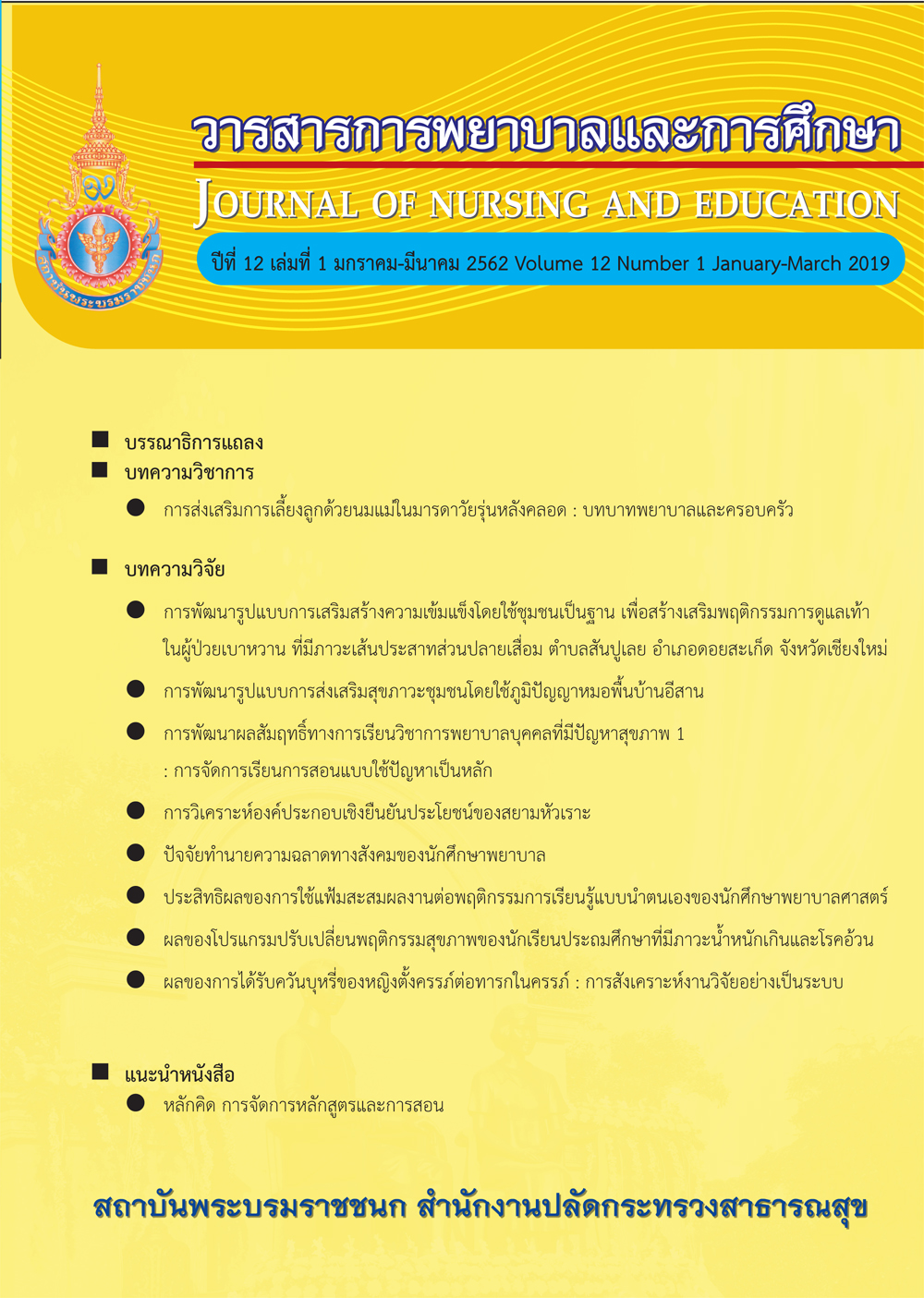Development of Learning Achievement for Nursing Care for Persons with Health Problems 1 : By Problem Based Learning Approach
Development of Learning Achievement for Nursing Care for Persons with Health Problems 1 : By Problem Based Learning Approach
Keywords:
Problem based-learning, Learning achievement, Problem-solving abilityAbstract
ABSTRACTThis quasi experimental research aimed to compare learning achievement between
nursing students taught by problem based learning method and nursing students taught
in the traditional way. Each group consisted of 75 nursing students in the second year of
the second semester of the academic year 2017. The samples were purposive sampling
according to the criteria. The control group received regular instruction. The experimental
groups were taught by the problem-based learning method. The research tools consisted
of 1) problem based learning plan,2) lecture learning plan, 3) learning achievement test,
and 4) nursing problem solving capability test. The data were collected by the questionnaire.
Process of data collection was from February to March, 2016. Data were analyzed by
frequency, percentage, mean, standard deviation, independent Sample t – test and paired
Sample t - test.
The results of the study showed that the experimental group had the mean score
of learning achievement had signifcantly higher than before received the program and
higher than the control group (p .001). Therefore, the researcher suggested that
the problem-solving approach should be applied for teaching in other subjects for nursing
students in order to promote the development of the ability to solve nursing problems
more effectively.
References
1. Offce of the National Education
Commission. National Education Act,
1999 (RevisedEdition 2002). Bangkok:
The Offce of the Prime Minister, 2002.
(in Thai)
2. Internal Quality Assurance Committee.
Internal Quality Assurance Manual for
Higher Education. 2nd ed. Bangkok:
Tanapress Company, 2017. (in Thai)
3. Hsu, L. Developing Concept Maps
from Problem-based Learning Scenario
Discussions. Issues and Innovations in
Nursing Education, 2004; 48(5): 510-518.
4. Savery, J. R. Overview of Problem-based
Learning: Defnitions and Distinctions.
Interdisciplinary. Journal of Problem
Learning, 2006; 1(1): 8-20.
5. Hamdan, A.R., Kwan, C.I., Khan, A., Ghafar,
M.N.A., Sihes, A.J. Implementation of
Problem Based Learning among Nursing
Students. International Education
Studies, 2014; 7(7): 136-142.
6. Dolmans, D.H.J.M., Grave, W.D., Wolfhagen,
I., & Vleuten Van Der, C.P.M. Problem
Based Learning: Future Challenges for
Educational Practice and Research.
Medical Education, 2005; 39: 732-741.
7. Instructors of Boromarajonani
Institute. Teaching and Learning
Manual for Problem-based Learning in
Boromarajonani Colleges of Nursing.
Nonthaburi: Yutarin Press, 2015. (in Thai)
8. Makmee, P. Problem-based Learning.
EAU Heritage Journal, 2011; 5(1): 7-14.
(in Thai)
9. Suwannoi, P. Problem-based Learning:
PBL. Documentation for the Description
in the Development of Teaching and
Learning [online]. 2015 [cited 2015/9/10].
Available from: https://ph.kku. ac.th/
thai/images/fle/km/pbl-he-58-1. pdf.
(in Thai)
10. Praboromarajchanok Institute for Health
Workforce Development. Manual Book
Guideline for Problem-based Learning
Model for Nursing Instructors under
Praboromarajchanok Institute for Health
Workforce Development. Nonthaburi :
Yutharinkanpim, 2015. (in Thai)
11. Chandee, M., Pale, P., Niamhom, P.,
Jongkae, P., & Sengpanit, T. Effect of
Case Study Teaching in the Subject of
Nursing Care for Person with Health
Problems Practicum I on Nursing
Students Abilities of Applying Nursing
Process. Journal of Nursing and Education,
2014; 7(4): 134-155. (in Thai)
12. Sungur, S. & Tekkaya, C. Effects of
Problem-based Learning and Traditional
Instruction on Self-regulated Learning.
The Journal of Educational Research,
2006; 99(5): 307-317.
13. Thailand Nursing and Midwifery
Council. Nursing and Midwifery Institute
Certifcation Manual for Educational
Institutions which Graduates of Bachelor
of Nursing Science Program. Nonthaburi:
Joodtong Company Ltd., 2013. (in Thai)
14. 14. Schmidt, H. G. and Moust, J. H. C.
Processes that Shape Small-group
Tutorial Learning: A Review of Research.
Mastricht: Datawyse Publishing, 2000.
15. Newman, M. J. Problem-based Learning:
An Introduction and Overview of the
Key Features of the Approach. JVME,
2005; 32(1): 12-20.
16. Saart, S., Piriyasurawong, P. Ninsok, P., and
Jerungsuwan, N. A Development of the
Problem-based Instruction Model Using
Electronic Media (PBIMUEM) on Learning
Achievement and Problem Solving
Ability of Nursing Students in Nursing
College under Praboromarajchanok
Institute. Academic Services Journal,
2012; 22(3): 150-162. (in Thai)
17. Imanieh, M.H. & Sobhani, A.R. Evaluation
of Problem-based Learning in Medical
Students’ Education. Advance Medical
Education Prof. Journal, 2014; 2(1): 1-5.
18. Kanyamee, T. & Thongpoon, C. Problembased Learning on Achievement and
Problem Solving Abilities in Science of
Mathayomsuksa II Students on the Topic
of Food and Existence, p. 355-365. In
the National Academic Symposium of
Graduate Network in North Rajabhat
University, 16. Phetchabun: Phetchabun
Rajabhat University, 2016. (in Thai)






